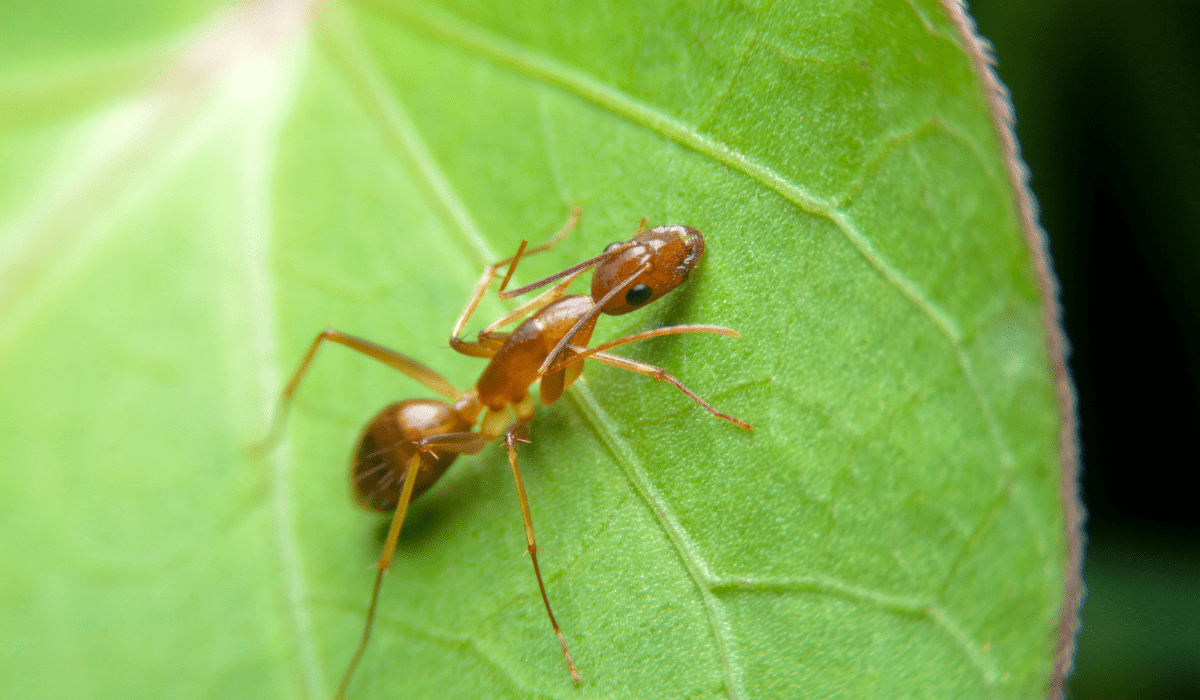
If you’ve spotted a swarm of crazy ants on your property, you may be wondering if these invasive ants can sting or pose a danger to you or your family.
Crazy ants, particularly the tawny crazy ant, are a reddish-brown ant species that are highly active and known for their erratic movements. While they don’t sting like fire ants, they can still cause plenty of headaches for homeowners.
Let’s take a closer look at whether crazy ants sting, how they protect themselves, and why controlling an infestation is so important.
Key Takeaways
- Crazy ants do not have stingers but use formic acid for their main defense, and their bites are mild.
- These ants cause problems by damaging electrical equipment, disrupting ecosystems, and multiplying into large, hard-to-control infestations.
- Signs of a crazy ant infestation include erratic movements, long legs, and nests in mulch, debris, or circuits.
- Professional pest control is the best way to handle crazy ant infestations, which are too big for DIY solutions.
DO CRAZY ANTS BITE OR STING?
Unlike fire ants, crazy ants do not have a stinger. Instead, they rely on formic acid as their main defense.
According to research from the University of Texas, crazy ants produce formic acid to protect their bodies. Secreted from specialized glands, this compound protects them from the toxic alkaloids in fire ant venom.
It is so effective that it allows them to neutralize the venom of fire ants during battles.
While their lack of a stinger makes their defense less painful for humans, crazy ants can still bite. Their bites are mild and non-venomous, typically causing only minor irritation.
What they lack in venom, they make up for in numbers. Colonies grow quickly, with worker ants invading homes, electrical equipment, and even trash cans in search of food.
The overwhelming presence of these ants during a large infestation can be far more unsettling than their bite.
WHY ARE CRAZY ANTS A PROBLEM?
Also known as the Rasberry crazy ants, they are considered an invasive species of ants and pose a variety of challenges for homeowners and ecosystems alike:
Electrical Equipment Damage
Crazy ants are attracted to electrical equipment, where they can cause short circuits and mechanical failures. Outside Louisiana, this behavior is a significant issue in areas like Houston, where infestations have been reported near industrial sites.
Ecological Impact
As an invasive species from South America, they disrupt ecosystems by outcompeting native ants and preying on insects that benefit the environment. This imbalance can affect natural pest control and the health of gardens and farms.
Infestations in Large Numbers
These invasive ants multiply rapidly, forming colonies that invade yards and homes. They nest in mulch, stumps, or piles of debris, staying hidden until their population surges, making it harder to control them without professional help.
Attraction to Honeydew
They rely on honeydew from aphids and similar pests as a food source. By protecting these insects, they worsen pest infestations, leading to increased plant damage and creating a bigger problem for homeowners and gardeners.
HOW TO IDENTIFY A CRAZY ANT INFESTATION
Crazy ants are easily recognizable by their:
- Erratic Movements: Unlike other ant species, crazy ants don’t march in straight lines but move chaotically.
- Long Legs and Antennae: These physical traits give them a distinctive appearance compared to other ants.
- Preference for Electrical Equipment: Finding ants near circuits, outlets, or machinery is a telltale sign of crazy ants.
If you’re noticing these signs, you may have a crazy ant infestation that needs professional attention.
HOW TO HANDLE A CRAZY ANT INFESTATION
Crazy ant infestations are notoriously tough to handle without expert help. Here are a few steps you can take to manage the ant problem:
- Keep your home clean and free of crumbs, pet food sources, or sugary residues that might attract ants.
- Get rid of stumps, piles of debris, and excess mulch around your yard to eliminate nesting sites.
- Block cracks and crevices in your home’s exterior to prevent worker ants from entering.
- Use ant baits strategically near trails or nesting sites, as not all work equally well on crazy ants.
WHY CHOOSE PROFESSIONAL PEST CONTROL?
Crazy ant colonies can grow so large that DIY pest management solutions aren’t enough.
At LaJaunie’s Pest Control, our exterminators specialize in effective ant control, including treating crazy ant infestations. Whether you’re dealing with piles of ants in your electrical equipment, crazy ant colonies under mulch, or worker ants invading your kitchen, our team has the tools and expertise to help.
Contact us today to protect your home from these invasive pests.